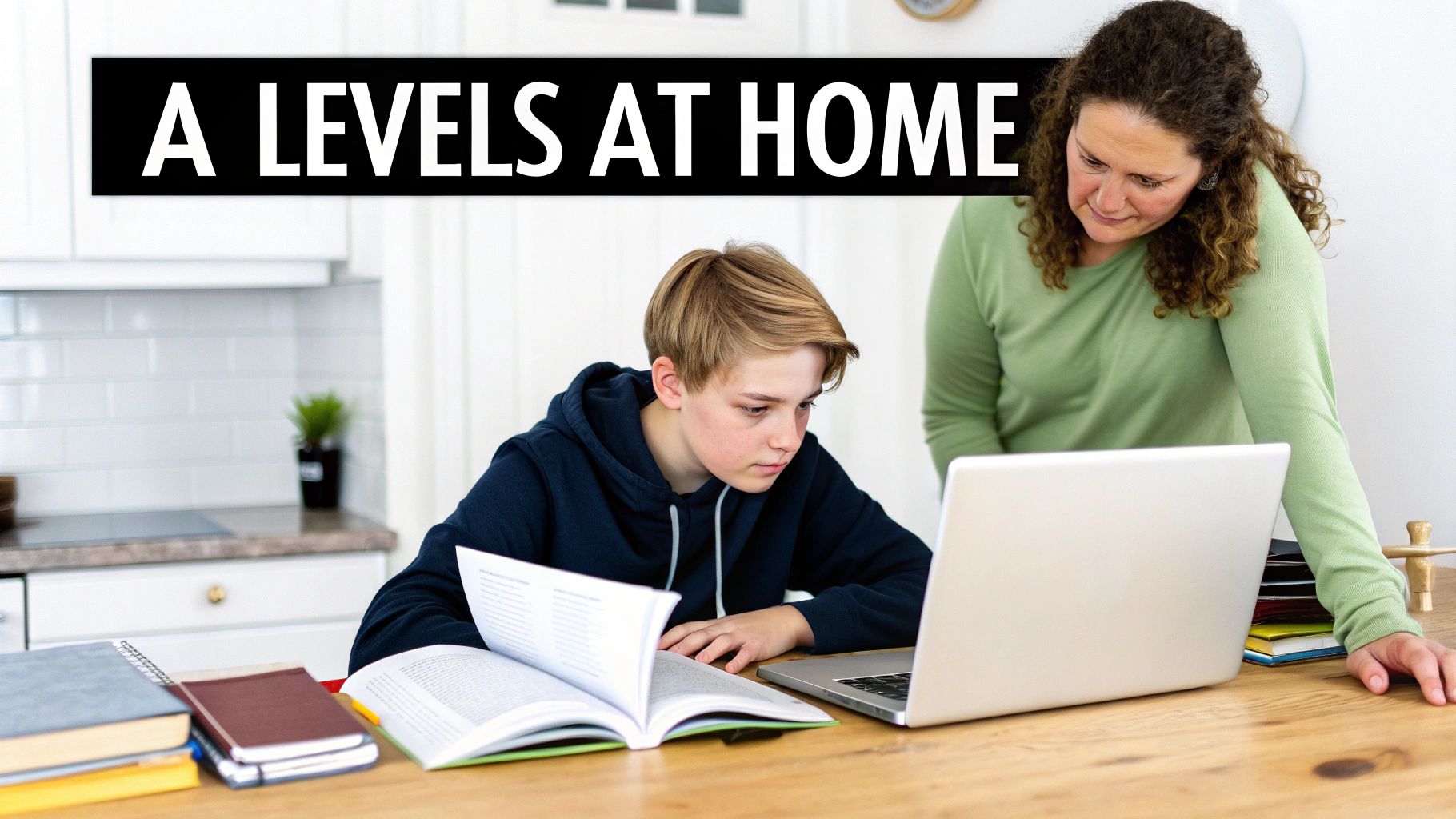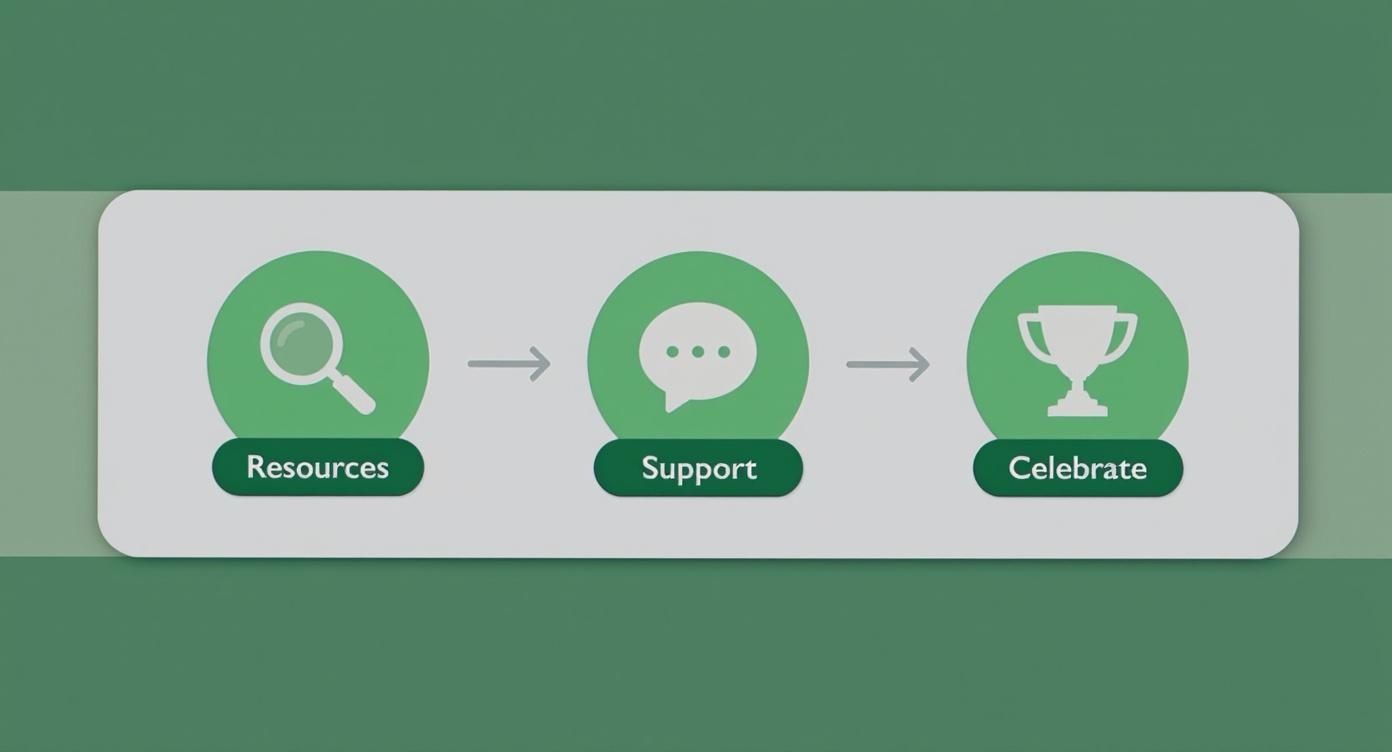Choosing to home educate for A Levels is a huge, empowering decision. It’s a path that puts your child’s unique learning style, passions, and well-being right at the centre of their education, offering a truly personal alternative to mainstream school for these crucial pre-university years.
Your A Level Journey Begins at Home
Deciding to home educate for A Levels can feel like a massive step, one filled with both excitement and a fair few questions. It's a feeling of wanting the absolute best for your child, and wondering if you have what it takes. Trust me, you’re not alone on this journey. It’s a path chosen by families who see the incredible potential in an education that bends to fit their child, rather than asking their child to bend to a rigid system.
This isn’t just about escaping a one-size-fits-all model. It’s about building an environment where your teenager can genuinely thrive. Imagine an A Level experience built around their real interests. For example, if your child is fascinated by ancient civilisations, home education allows them to dive deep into A-Level Classical Civilisation for weeks on end, visiting museums and watching documentaries, without being cut off by a bell. It’s about letting their curiosity lead the way.

Why More Families Are Choosing This Path
The move towards home education isn't some fringe movement; it's a fast-growing trend right across the UK. More and more families are drawn to the flexibility and focus it offers during the critical A Level period. This approach allows for a study schedule that works with your child’s energy levels, hobbies, and even part-time work or volunteering, helping them build a healthier work-life balance from a young age.
You can see this growth in the official figures. In the UK, elective home education has seen a major jump, especially in the last few years. During the 2023/24 academic year, government data showed that around 153,300 children were home educated at some point in England. That's a huge leap from the 126,100 recorded the year before—an increase of about 21.5%.
Putting Your Child at the Centre
At its heart, the decision to home educate for A Levels is driven by a desire to give your child the best possible launchpad for their future. It's about so much more than just academics; it’s about looking after their mental well-being, building their confidence, and sparking a genuine love for learning that lasts a lifetime. For a child who felt anxious or unseen in a large classroom, this one-to-one focus can be transformative, helping them rediscover their love for a subject they thought they hated.
This journey is about crafting an educational experience that honours your child as an individual. It's about empowering them to take ownership of their studies, preparing them not just for exams, but for a lifetime of curiosity and self-directed success.
As you start out, looking into different online learning platforms can provide amazing support and resources. For instance, you might find useful tools and information from Shortgenius learning resources. By always putting your child's needs first, you're laying the foundation for an experience that is not only academically successful but deeply fulfilling. You can read more about the positive impact of this style of education by exploring the benefits of homeschooling.
Understanding Your Legal Responsibilities
Before you start hunting down syllabuses and ordering textbooks, it's wise to get your head around the legal side of things. The thought of bureaucracy can feel a bit daunting, and it's normal to worry if you're "doing it right." But the reality of home educating at A-Level is often much simpler than you might think, especially once your child is past the compulsory school age of 16.
This section is all about giving you clarity and peace of mind. We'll walk through what you need to know, step-by-step, making sure your child’s needs stay right at the heart of the process. The goal is for you to feel confident that your plan isn't just legally sound, but also perfectly set up to help your teenager achieve their future goals.
If your child is currently finishing their GCSEs at a mainstream school, your first official step is to withdraw them. You'll need to write a clear letter to the headteacher, stating your intention to deregister your child to begin home education. Once the school gets this letter and takes your child off their roll, the legal responsibility for their education shifts entirely to you.
What Is a Suitable Full-Time Education?
The key legal phrase you'll encounter is your duty to provide a 'suitable' full-time education that's appropriate for your child's age, ability, and aptitude. But what on earth does 'suitable' actually mean when you're planning for A-Levels at home? It definitely doesn’t mean you have to replicate a school timetable minute-by-minute.
It’s more about having a clear, intentional plan that puts your child's needs first. For example, a "suitable" education for a budding engineer would look very different from one for a future artist. It's about tailoring the content and resources to their specific goals.
- A Documented Learning Plan: This doesn't need to be complicated. A practical example could be a simple spreadsheet outlining the three A-Levels chosen, links to the online courses you're using for each, and a weekly checklist of topics to cover from the syllabus.
- Clear Educational Goals: Your plan should show how you're preparing them for their chosen A-Level exams and what comes next, whether that's getting into university or pursuing a specific career.
- The Right Resources: It's about showing you have access to the necessary materials. This might include exam board specifications, revision guides, past papers, and, for certain subjects, access to science labs.
The main thing is to demonstrate that you've created a structured and well-resourced learning environment designed to help your child succeed. It’s about your intent and provision, not ticking boxes on some standardised checklist.
Your Relationship with the Local Authority
Here's where things really change. After the age of 16, your relationship with the Local Authority (LA) is completely different. Because your child is now beyond compulsory school age, the LA has no formal duty to monitor their education. You are not required to tell them you're providing a home education A-Level course, although some parents do choose to drop them a line as a courtesy.
This freedom can feel incredibly empowering. It gives you the space to create an educational path that truly fits your child, without needing to justify your choices to anyone else. For a deeper dive into the rules around this, our guide on home schooling in the UK offers some extra useful details.
The legal framework for post-16 home education is built on trust. It trusts you, as the parent, to act in your child's best interests—to provide an education that isn't just adequate, but one that truly nurtures their potential and prepares them for whatever comes next.
At the end of the day, your responsibility is to your child. By putting together a thoughtful, well-resourced, and supportive learning environment, you're not only meeting your legal obligations but also laying the foundation for their academic and personal success. This is your chance to build an education that genuinely inspires them.
Choosing Subjects That Inspire Success
Right, you’ve sorted the legal bits and pieces. Now for the exciting part. This is where your child's home education A Level journey really comes alive—building a curriculum that truly reflects who they are and where they want to go. The feeling of co-creating their future with them is one of the most rewarding parts of this process.
Think of it as a collaborative project. You’re moving away from the rigid columns of a school options form and stepping into a space where your child’s passions, university dreams, and career ideas are the main focus. It’s about being strategic, creative, and genuinely personal.
Forget just picking subjects because they sound ‘academic’ or ‘traditional’. Let’s say your teenager is obsessed with video game design. A typical school might offer a very narrow path, but at home, you can assemble something incredibly powerful. Imagine combining A Levels in Computer Science, Art and Design, and Mathematics. Suddenly, you’ve built a stunning portfolio that speaks directly to that industry. This is how you design an education that feels purposeful, not just compulsory.

Aligning Subjects with Future Goals
The first step is a proper, sit-down conversation with your child. Where do they see themselves in five years? Are they aiming for a specific university course like medicine or engineering, which have non-negotiable A Level requirements? Or is their path more creative, geared towards building a standout portfolio for an arts degree?
Here’s what to consider:
- University Aspirations: Get granular with the entry requirements for their top university choices. Many Russell Group universities, for instance, have lists of ‘facilitating subjects’ they strongly prefer for certain degrees. Don't guess—check the source.
- Career Paths: If they have a career in mind, work backwards from it. A practical example: a future architect will almost certainly need Maths and Physics, often rounded out by an art-related subject like 3D Design to build a strong portfolio.
- Genuine Passion: This is the secret weapon. A student who genuinely loves a subject will put in the hours without being asked, dig deeper into the content, and ultimately achieve more. That feeling of excitement they get from a subject like Sociology or English Literature is what will carry them through the tough revision periods. Never underestimate an A Level taken purely for the love of it; it shows intellectual curiosity and a well-rounded character that universities love to see.
How Will Your Child Learn Best?
Once you’ve got a shortlist of subjects, the next big question is how you're going to deliver the content. This is a deeply personal choice that depends on your child’s learning style, your family’s budget, and how much hands-on support you can realistically provide. Does your child need the structure of daily live lessons, or do they thrive when left to explore topics at their own pace with a set of textbooks?
The landscape of elective home education in the UK is growing, with an estimated annual increase between 2% and 8%. Technology has made this path more accessible than ever before. The UK’s educational technology market was valued at around £3.2 billion after a massive 72% jump in 2020 alone. This explosion gives families incredible tools to deliver a top-tier A Level education. You can explore more UK education statistics to see these trends for yourself.
The most effective learning approach is one that aligns with your child's natural inclinations. Forcing a self-directed learner into a rigid online classroom, or expecting a student who needs interaction to thrive on textbooks alone, misses the entire point of a personalised education.
Let’s break down the three main pathways you can take.
Comparison of A Level Home Education Approaches
Each method for delivering A Level content at home has its own unique flavour, with clear pros and cons. There's no single 'best' way to do it; the right choice is simply the one that fits your family's circumstances like a glove.
This table should help you see how they stack up.
| Approach | Best For | Pros | Cons |
|---|---|---|---|
| Self-Study | The highly motivated, independent learner who enjoys deep research. | Extremely cost-effective; offers complete flexibility over pace and schedule; builds self-discipline. | Requires immense self-motivation; can feel isolating; parents must source all materials. |
| Online A Level Courses | Students who thrive with structure, live teaching, and peer interaction. | Expert teachers; structured curriculum; built-in community; access to resources and exam entry support. | Higher cost than self-study; less flexibility in lesson timing; reliant on technology. |
| Private Tutors | Learners needing one-to-one support or help with a specific, tricky subject. | Completely personalised teaching; targets specific weak areas; can work alongside other methods. | The most expensive option; can be challenging to find the right tutor for every subject. |
In the end, many families discover that a blended approach works best. You might use a structured online course for a technical subject like Chemistry, bring in a private tutor to build confidence in Further Maths, and let your child fly solo with self-study for an essay-based subject like History.
This is the real beauty of a home education A Level programme—you are the architect. You get to build a structure that perfectly supports your child’s success, brick by brick.
Designing a Study Schedule That Works
Flexibility is one of the greatest gifts of home education, but A-Levels demand a solid framework to build success upon. The goal isn't to replicate a rigid school timetable. It’s about creating a study schedule that respects your child’s natural rhythm while nurturing the self-discipline they'll need for university and whatever comes next. This is a routine they can truly own and feel good about.
First things first: do a little observation. Is your teenager an early bird who’s sharpest at 8 a.m., or a night owl whose brain only really kicks into gear after dinner? Working with their natural energy cycles, rather than fighting against them, is the secret to making learning both productive and enjoyable. It cuts down on stress and makes study time feel far less like a chore.
When you centre the schedule around your child's needs, you empower them. You’re sending a clear message that their well-being and learning style are more important than any arbitrary clock.

Breaking Down the Syllabus
Staring at an entire A-Level syllabus can be overwhelming, to say the least. The trick is to chop it up into manageable, bite-sized pieces. Sit down together with the exam board specification for each subject and start mapping it out—first across the academic year, then term by term, and finally, week by week.
This collaborative planning process is absolutely vital. It gives your child a clear roadmap and helps them see how each small study session contributes to the bigger picture. All of a sudden, the vague task of 'revise Biology' transforms into a practical, achievable goal like: 'this week, I will master the process of cellular respiration by watching three videos, making flashcards, and completing a past paper question.' That’s far less intimidating and much more actionable.
Building in time for creating effective study guides can also seriously boost retention and make your study schedule more productive.
Finding a Rhythm That Works
Once you have your weekly goals, you can start blocking out time in the calendar. But remember, this schedule is a living document, not something set in stone. Be ready to tweak it as you both discover what truly works best.
Here’s a practical example of a structure for a student who is a morning person and also has a part-time job in the evenings:
- 9:00 – 10:30: Deep Work Session 1 (e.g., Maths problem-solving)
- 10:30 – 11:00: Active Break (a walk, some stretching, a snack)
- 11:00 – 12:30: Deep Work Session 2 (e.g., History essay writing)
- 12:30 – 2:00: Lunch & Downtime (completely unplugged)
- 2:00 – 3:00: Lighter Task (e.g., vocabulary review, organising notes)
- Afternoon: Hobbies, social time, or getting ready for their job.
This kind of structure balances intense focus with crucial recovery time, which is key to preventing burnout and keeping motivation high. It also carves out plenty of space for all the other important parts of being a teenager.
Powerful Time Management Techniques
To make those study blocks even more effective, you can introduce some tried-and-tested methods. The Pomodoro Technique, for instance, is a fantastic tool for beating procrastination and staying focused, especially for a child who finds it hard to start a big task.
It’s simple. It works like this:
- Choose a single task to work on.
- Set a timer for 25 minutes.
- Work on that task—and only that task—until the timer goes off.
- Take a short 5-minute break.
- After four of these 'Pomodoros', take a longer break of 15-30 minutes.
This method breaks daunting study sessions into short, manageable sprints, making it so much easier to get started and maintain focus. Cultivating these skills is a crucial part of any home education A level journey. If you'd like to dive deeper, there are some excellent time management techniques for students worth exploring.
The ultimate goal is to create a schedule that fosters independence, not dependence. By working together to build a routine that respects their needs and teaches them valuable life skills, you are preparing your child for success far beyond their A Level exams.
Your Role as a Learning Facilitator
One of the first anxieties that surfaces for parents considering the home education A-Level path is the thought, "But I don't remember A-Level Chemistry!" Let's just take a deep breath. Your role isn't to be the all-knowing teacher; it's to be something far more powerful: a learning facilitator and your child's number one supporter.
This shift in mindset is incredibly freeing. You don't need to have all the answers. Your job is to become an expert at finding resources, asking great questions, and building a supportive team around your child. It’s about creating an environment where they feel safe and have everything they need to succeed, both academically and emotionally.
Think of yourself as the project manager for their A-Level journey. You're there to clear roadblocks, source the best tools, and keep morale high when they're feeling overwhelmed. This approach empowers your child to take real ownership of their learning, helping them build the independence and research skills that universities prize so highly.
Becoming a Master Resource Finder
Your first task is to curate a brilliant library of learning materials. This doesn't mean you need to understand every last concept yourself. It just means knowing where to find the people and resources that do.
A practical example: one parent, whose daughter decided to tackle A-Level Physics, felt completely out of her depth. But instead of giving up, she became a resource detective. She found incredible online video lectures from university professors, subscribed to a service providing past papers with worked solutions, and connected with a local university student for occasional tutoring. She didn't teach a single equation, but she built the perfect learning ecosystem for her daughter to thrive in.
Here are some key resources to start looking for:
- Online Video Lectures: Platforms like YouTube and other educational websites host entire A-Level courses taught by expert teachers, often for free.
- Revision Guides and Textbooks: Look for materials endorsed by the specific exam board your child is following (e.g., AQA, Edexcel). This is non-negotiable.
- Specialist Tutors: Know when to call for backup. A good tutor can untangle a tricky topic in a single hour that might otherwise take days of your child feeling frustrated and alone.
Fostering a Supportive Learning Environment
Your emotional support is every bit as important as the academic resources you provide. A-Levels are tough, and the pressure can be immense. Your role is to foster a low-stress atmosphere where it's safe for your child to say, "I'm struggling with this," without fear of judgement.
This means celebrating the small victories—mastering a difficult chapter, completing a tough past paper, or finally grasping a concept that seemed impossible. That feeling of shared success builds the resilience and confidence essential for tackling exam anxiety head-on.
Your most crucial role is to be the calm in the storm. By managing exam stress together and reinforcing a growth mindset, you provide the emotional foundation that allows academic excellence to flourish.
This tailored, supportive environment is a key reason why so many home-educated students do so well. In fact, the evidence often points to high academic achievement among UK homeschooled students. Research indicates their standardised assessment results can be between 15% and 30% higher than their peers in mainstream schools, a testament to the power of a customised learning journey. You can discover more insights about these findings on My Edspace.
Ultimately, facilitating a home education A-Level programme is about building a team. It's you, your child, and the network of resources and experts you assemble—all working towards the same goal: helping them achieve their full potential.
Navigating A Level Exams as a Private Candidate
This is it. The moment all that hard work has been building towards. For many home-educating families, the final exam process can feel like the single biggest hurdle on the A-Level journey, sparking a flurry of anxieties for both you and your child. That feeling of "what if we miss a deadline?" is completely normal.
But with a clear plan, this administrative mountain shrinks into a manageable series of steps.
Think of this not as a final boss battle, but as the logistical lap of honour. It's about turning two years of dedicated learning and personal growth into a tangible, recognised qualification. Let’s demystify the process of entering exams as a private candidate and turn that stress into confident action.
Finding and Registering with an Exam Centre
Your first, and most critical, task is to find an exam centre. These are typically schools, colleges, or dedicated tuition centres that are registered to host private candidates for official exams. You are not on your own here; exam boards like AQA and Pearson Edexcel maintain lists of approved centres on their websites.
Start your search early—and by early, I mean the autumn before the summer exam season. This gives you plenty of time to contact centres, compare their services, and secure a place without the last-minute panic. When you get in touch, be clear about your child's needs and the specific subjects and exam boards they are studying.
The registration process involves providing key documents, so it's a good idea to have them ready to go:
- Proof of Identity: Usually a passport or birth certificate.
- Unique Candidate Identifier (UCI): If your child has taken formal exams like GCSEs before, they will already have one of these.
- Subject and Unit Codes: These must be exact. You can find them on the exam board’s specification documents for each A-Level.
Tackling Coursework and Science Practicals
For many families, the biggest question mark hangs over subjects with practical elements. What about Non-Examined Assessments (NEAs), coursework, or the mandatory science practicals? This is where finding the right centre is absolutely vital to support your child.
Not all centres can accommodate NEAs or practical assessments, so when you make your enquiries, this should be one of your very first questions. Some centres offer a complete package, providing lab access for the Common Practical Assessment Criteria (CPAC) in Biology, Chemistry, and Physics, along with an assessor to mark coursework.
For example, a student studying A-Level History with a coursework component would need a centre with an affiliated History teacher who can authenticate and mark their work according to exam board rules. It definitely requires more planning, but it is entirely achievable.
The key visual below illustrates the simple but powerful process of you, the parent, acting as a facilitator—finding resources, offering support, and celebrating success.

This process flow shows how your core role is about enabling your child's success at every stage, especially during this practical exam phase.
Understanding and Managing the Costs
There’s no getting around it: sitting A-Levels as a private candidate comes with costs. These fees cover the exam entry itself, administration charges from the centre, and any additional costs for practical assessments or coursework marking.
The fees can vary dramatically from one centre to another, so transparency is everything. Don't be afraid to ask for a complete, itemised breakdown of all costs before you commit to anything. A good centre will understand your need for clarity and will be happy to provide this.
Managing this final step is all about careful planning and early action. By starting the process in the autumn, you give yourself the best chance to find a welcoming, affordable centre that meets all your child's needs. This transforms a potentially stressful process into a clear checklist, ensuring their incredible hard work gets the recognition it deserves.
Any Questions?
Deciding to home educate for A-Levels is a big step, and it’s completely natural for questions and a few wobbles to surface as you get closer to a decision. We get it. Below, we’ve answered some of the most common queries we hear from parents, hopefully giving you the clarity and confidence to move forward.
How Do Universities View Home Educated A-Level Applicants?
This is often the number one worry, but let me put your mind at ease: the reality is incredibly positive. UK universities are completely used to seeing applications from home-educated students. They treat them with the same weight as those from traditional schools. At the end of the day, what they really care about are the A-Level results, the personal statement, and the reference.
In fact, being home-educated can often be a huge advantage. It gives your child a unique story to tell. They can write powerfully about the self-discipline, passion, and independent research skills they’ve had to develop.
Imagine a student who designed their own study schedule to balance A-Level Biology with volunteering at an animal rescue. That doesn’t just show academic ability; it shows maturity, time management, and real-world commitment—exactly the qualities that make admissions tutors sit up and take notice. Your child isn't just another applicant; they are someone who has taken control of their own education, and that is impressive.
Will My Child Miss Out on Socialisation?
The image of the lonely, isolated home-schooled teen is a myth that just won’t quit. But true socialisation doesn’t just happen in a busy school corridor between lessons; it happens out in the real world. A flexible home education schedule actually creates more time for meaningful social connections that are aligned with your child's interests, not less.
Think about it. Your child has the freedom to join local sports teams, drama clubs, volunteer organisations, or even get a part-time job. They can connect with other home-educated students for study sessions or social events, either online or through local meet-up groups. A practical example: a teenager passionate about film could join a local filmmaking club, connecting with peers who share that specific passion, forming deeper bonds than they might in a general school setting.
The goal isn't just to be around other people. It's to help your child build genuine connections based on shared interests and mutual respect. Home education gives your child the time and freedom to find their tribe.
Can We Still Get UCAS References?
Yes, absolutely. You don’t need a traditional school to secure a strong UCAS reference. The reference can be written by anyone who knows the student in an academic or formal capacity and can speak to their readiness for higher education.
This could be someone like:
- A private tutor who has worked with them closely on one or more A-Level subjects.
- An examiner or course leader from an online school or another learning provider.
- A respected community figure who has supervised them in a long-term role, like a museum curator or a charity manager.
The trick is to choose someone who can genuinely and enthusiastically vouch for your child's academic skills and character. It’s always a good idea to approach a potential referee well in advance. Give them plenty of information about your child’s studies, projects, and achievements to help them write a reference that’s both detailed and compelling.
At Queens Online School, we know the A-Level years are about more than just exams; they’re about nurturing individual potential. Our live, interactive classes, expert teachers, and supportive global community provide the perfect framework for your child to excel academically while building the independence and confidence to thrive at university and beyond. Discover how we can support your family's unique educational journey at https://queensonlineschool.com.

